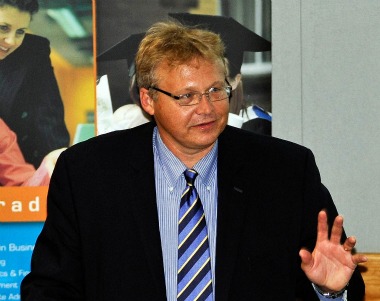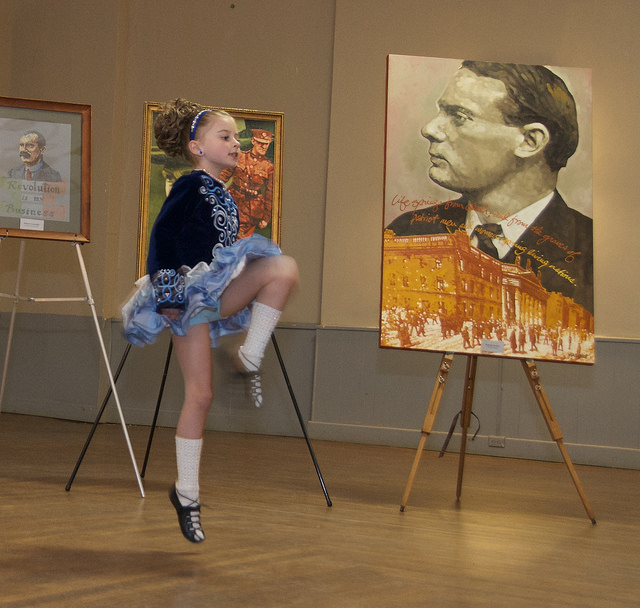Ireland is famous for its writers and storytellers, but these days, numbers, rather than words, are what tell the Irish story. Numbers like these:
• Between 2006 and 2010, the average family income in Ireland was cut in half.
• The average per capita debt is 37,000 euro ($51,544).
• Ireland lost 20,000 jobs between the years 2000 and 2006.
• The country’s debt now stands at 876 billion euro ($1.2 trillion).
Sean Kay, PhD, has been a regular visitor to Ireland since 1987. He traces his roots there and his wife is an Irish citizen. But until recently, his private and professional lives hadn’t meshed the way they do now. As Gershon professor of politics and government and chair of international studies at Ohio Wesleyan University, Kay had written about, in his words, “the big wars, global security stuff, and big international security issues,” the kind of thing that got him noticed by Barack Obama during the 2008 presidential campaign.
“I was asked to be part of a team advising Obama on issues related to Europe and Afghanistan, and because I had contacts in Ireland, I asked if I could also advise on Irish issues,” Kay explains. “I’m not a political person, but I was interested in getting involved and it was a good experience that I would never do again. But it got me thinking that there was a story to tell about Ireland and I wanted to tell it.”
That story is Kay’s latest book, “Celtic Revival? The Rise, Fall, and Renewal of Global Ireland “ (Rowman & Littlefield Publishers, 2011). He’ll be speaking about Ireland’s boom and bust, along with Irish Consul General Noel Kilkenny, on Friday, November 4, at Temple University Center City. The program is sponsored by Irish Network-Philadelphia. For more information, see our calendar.
We talked to Dr. Kay this week about the collapse of the “Celtic Tiger” and what the future holds for Ireland.
In your book, there are a couple of lines that really struck me. “For a young generation that had never experienced bad times, a wealthy and comfortable Ireland was the new norm—and the expected future. Thus the desperate condition Ireland found itself in by 2008 came as a horrific shock to a country that had never previously experienced boom and bust.” Ireland is one of the “young” countries in Europe—that’s at least a quarter of their population and they’ve never known anything but prosperity until now. Where does this leave them?
By about 2001 an entire society for first time in history had disposable income, purchasing ability, all built on loose credit. It was a mirage. It wasn’t real. When it burst, you had an interesting set of layers going on. The first one is that this was brand new wealth. People got rich pretty fast and that was just gone. The second layer is that people under 35 who didn’t cause any of that are going to be feeling the effects for the rest of their lives probably, between emigration and having to pay back somebody else’s broken promises on debt.
What went wrong?
There were really good foundations for the original Celtic Tiger of the late 1980s and mid-1990s. [In the book, Dr. Kay writes that Ireland benefited from its well-educated population and low business taxes which attracted significant foreign investment largely by pharmaceutical, technology, and healthcare companies.] Then the politicians got so obsessed with the electoral rewards and manifestations of the idea of large growth. Instead of slowing economic growth to about three percent and going for strong, gradual growth, they wanted eight, nine, 11 percent annual growth. But the export market flattened as had the impact the foreign direct investment. Ireland had lost its competitiveness, which was the premise of the Celtic Tiger. The way they sustained it was by artificially inflating the economy by allowing de-regulation of the mortgage market. Then you got a microcosm of what happened here: people leveraging a mortgage to pay for two or three other mortgages and then there was less revenue for the budget. [In his book, Dr. Kay quotes Irish economist Morgan Kelly who captured the housing bubble fiasco succinctly: “We have spent the last five years learning to believe that exports and competitiveness don’t matter, and that we can get rich by selling houses to each other.”] But what has shocked me the most is how steep the decline Ireland’s education system has been. It’s off the cliff. It went from being one of the best education systems in Europe and now ranks at the bottom in how much the government spends for education.
One of the things I learned from your book was that U2, whose lead singer Bono is linked to African causes including hunger and AIDS, actually took its publishing arm out of the country when the tax laws for artists changed and they were going to be taxed on anything above a quarter million euro. I found that hypocritical and disappointing.
To be fair, they didn’t do anything illegitimate or illegal. They’re not tax dodgers. They still live there and pay taxes as individuals. They were taking advantage of a tax loophole that the government tried to rein in. In Ireland, artists lived tax exempt. Of course, the idea was to help struggling artists, not massive bazillionaires. It was to give them a leg up as they got started. When it changed, U2 packed up and left. That represented a loss of 40 million euro a year to the Irish people. There is a point to be made that keeping the tax rate friendly to business is a good thing. The problem is that U2 posture themselves as a moral business, their own countrymen are hurting and they’ve taken their money out. But lots of wealthy Irish people moved to Monaco and Cyprus, and that money has yet to come back.
You talk in the book about how the cultural lack of self-esteem and avoidance of talking about serious problems has kept Ireland from asking for help and for getting back on track in ways both economic and social. What exactly did you mean by that, and has it changed?
You know, when I mention that to people, everyone knows exactly what I’m talking about. Look at the church for example. For years, people never talked openly about the Catholic Church and the scandals they knew were in it. I spent some time talking to [singer] Sinead O’Connor about her ripping up the photo of the Pope on Saturday Night Live [in 1992], something that was offensive to me and to many other people at the time. I asked her why she didn’t tell people why she was doing it. Americans didn’t understand, but people in Ireland knew what she was trying to say and they didn’t want to grapple with it. Now, with the child abuse scandal in the church and the economic crisis, all these things that couldn’t be talked about before are forced on people. Debt is not something anyone wanted to talk about, but now the whole country is in debt and it’s affecting everyone at the kitchen table level. We’ve picked that up in America too. The president didn’t even mention the oil spill in the Gulf in his state of the union speech this year and it was one of the biggest things we should be talking about—our dependence on oil. This is one place where the Irish are leading the world.
You’re sounding a little hopeful. Do you think things are going to get better in Ireland?
I see a ray of hope, but it’s different from what people might expect. It’s not going to one of getting back to where things were by any means. But there are
five key reasons there’s good reason to be optimistic about Ireland’s future. The first point has to do with fact that the Irish are being brutally frank now, demanding an accounting from their leaders and their banks and demanding transparency because of harsh lessons they’ve been through. Now they’re talking about it and even having some basic discussions of what it means to be responsible citizen in a democracy. Because of the church issues, you also see a real desire for justice and equality. You have [Taoiseach] Enda Kenny giving a speech where he says “this is not Rome, this is the republic of Ireland 2011.” And you see a major social transformation going on involving the face of Ireland. Walk around Dublin today and it’s not all white Irish-looking people you see. It’s multicultural, multi-religious, and much more progressive than most people realize. Ireland has much more progressive national legislation on civil partnerships, for example. Seventy-two percent of the population say they support gay marriage, so it’s not really the conservative country many people think it is.
What does that have to do with getting Ireland back on its feet?
This kind of thing sends a message to the world and to business that Ireland is open and welcoming. That’s really important because businesses want a good environment. I also think that they’re sending a message of peace out of Northern Ireland though I still think that needs a lot of work. That brings me to the fifth reason I’m optimistic about Ireland’s future. The country’s foreign policy has been very innovative and sends a signal of goodwill to the rest of the world. Ireland does peacekeeping, provides food aid in Africa and other Third World countries, and the Irish were the architects of the nuclear proliferation treaty. Those things provide a basic foundation on which a new economy and political and social life can be built. Their economy is not going to save them. It’s going to be these other things that make Ireland a role model for how to think about priorities. There’s much the Irish can do to teach the world. What’s going to get Ireland through ultimately is its classic sense of home, family, and community.


